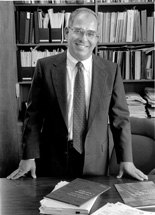SSA Centennial Celebration
Profiles of Distinction Series
Harold A. Richman, A.M. 1961, Ph.D. 1969
Hermon Dunlap Smith Professor Emeritus, SSA and the College Dean, School of Social Service Administration (1969–1978) Founder and Director, Chapin Hall at the University of Chicago (1985–2001)
Upon earning his A.B. from Harvard in 1959, Harold Richman planned to obtain a Ph.D. and become a history professor. However, his journey to social work and SSA had already begun.
Mr. Richman recalls, “It was a gradual process that began during my undergraduate years with a book I read for my literature class and grew through the kinds of jobs or volunteer work I did during those years. The book, Oscar Handlin’s, The Uprooted, was most influential. I became acutely conscious of the economic, social, and political injustices in our country. I was unaware of these injustices growing up in Cleveland.”
Mr. Handlin’s 1952 classic, which chronicled the depressing conditions immigrants to the United States faced in the early 1900s, spurred Mr. Richman to help others living in deprivation. He volunteered at a settlement house in Boston, taught a literature course in a maximum-security prison, and worked one summer for the Cleveland Department of Public Assistance. After these experiences, he vowed to devote his career to influencing social, economic, or political reform and began to investigate schools of social work.
“I wanted a place where I could combine social reform and social research. Everything I read about the women who founded the School seemed to support my own beliefs and goals, so I selected SSA.” While Mr. Richman was satisfied with his SSA education in casework and policy, he “thought the broader social work profession had lost its edge on social reform of public entities. The emphasis on social reform had begun to disappear. There was more emphasis on reforming the individual.”
In 1961, newly armed with an A.M., Mr. Richman worked at the National Institute of Health, but found even less emphasis on reform in a large bureaucracy. Believing a Ph.D. would better serve his aspirations, he again selected SSA because of the flexibility it offered in course selection and interdisciplinary study. Faculty members Rachel Marks (Rachel Marks, Ph.D.) and Frank Bruel (Frank R. Bruel, Ph.D.) suggested he apply for the White House Fellows Program, and he was accepted and served as Assistant to the Secretary of Labor, Willard Witrz, for two years. The knowledge he gained about how national government works and the contacts he made during his fellowship were invaluable to the rest of his career. To this day, he remains grateful to Ms. Marks and Mr. Bruel for their encouragement and impact on his career.
When his fellowship ended in 1967, Mr. Richman joined the SSA faculty, teaching policy courses as he finished his dissertation. By 1969 he had completed his Ph.D. and was offered a position with David Rockefeller in New York. Retiring Dean Alton Linford (Alton Linford, Ph.D.) and University President Edward Levy (Edward H. Levy, J.D.) conspired to retain the impressive young faculty member. Despite Mr. Richman’s youth, President Levy offered him the SSA deanship. Mr. Richman discussed both positions with his wife, Marlene, and decided to decline the Rockefeller offer. He remembers, “My wife said ‘That’s not who you are.’ I realized that I could come closer to my objective of influencing the profession back toward social reform at SSA. I also realized that my education at SSA and my experiences in Washington had been most formative, and I could blend them.” He became dean in the 1969–1970 academic year.
Mr. Richman’s early years as dean were challenging. The turbulence that had erupted nationally and on campus in the wake of the Vietnam War made it difficult to maintain a climate for free expression and critical examination. Despite the tensions of the time, however, he was able to move SSA forward. Through his contacts in Washington, he secured a Consolidated Grant from the U.S. Department of Health Education and Welfare (HEW). The grant was part of a HEW experiment to streamline government by moving away from categorical funding for specific services to a consolidation of all services within one grant. This grant was renewed annually, permitting him to expand SSA’s curriculum and offer more student aid, fostering diversity. He also attracted faculty from other disciplines to develop programs that expanded the social work knowledge base. This expansion included the development of the Generalist program by Bernece Simon (Bernece K. Simon, A.M.); Taskcentered Practice by faculty members Laura Epstein (Laura Epstein, A.M.) and William Reid (William J. Reid, Ph.D.); and the Applied Behavior Analysis sequence by Elsie Pinkston (Elsie M. Pinkston, Ph.D.).
After serving almost ten years as dean, Mr. Richman resigned to found Chapin Hall at the University of Chicago, realizing his dream of “bringing research and scholarship together as a goad to action in the service of children. I saw this as really picking up the mantle of SSA’s founders, Edith and Grace Abbott and Sophonisba Breckinridge. It was based on their model of studying the problem issues in a society to garner knowledge that can produce change.” He has established the Chapin Hall model in several countries, taking the local culture into consideration.
Mr. Richman feels that the ideals of SSA’s founders, and their belief in scholarship and research as the basis for practice and policy intervention, supported his own values and guided his career. He states, “SSA gave me the room to pursue and develop my own values, and beliefs, and develop a foundation of knowledge on how to create reform.”
